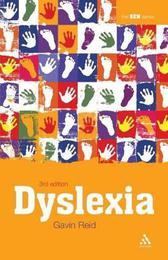
|
Dyslexia
Paperback / softback
Main Details
| Title |
Dyslexia
|
| Authors and Contributors |
By (author) Dr. Gavin Reid
|
| Series | Special Educational Needs |
|---|
| Physical Properties |
| Format:Paperback / softback | | Pages:256 | | Dimensions(mm): Height 216,Width 138 |
|
| ISBN/Barcode |
9781441165855
|
| Classifications | Dewey:371.9144 |
|---|
| Audience | | Professional & Vocational | |
|---|
| Edition |
3rd edition
|
|
Publishing Details |
| Publisher |
Continuum Publishing Corporation
|
| Imprint |
Continuum Publishing Corporation
|
| Publication Date |
17 March 2011 |
| Publication Country |
United States
|
Description
This third edition of Gavin Reid's popular book for non-specialist teachers has been thoroughly revised throughout and supplemented with additional material to reinforce the link between theory and practice. Dyslexia is a comprehensive overview of the field, providing more than just a quick fix to immediate difficulties by introducing the evidence base for why particular approaches may be effective. Topics include reading, spelling, creative writing, study skills, differentiation, identification of dyslexia, individual learning styles, the role of parents and policy and provision for dyslexia. A concluding section provides information on additional support and resources for use by teachers. Throughout, the book emphasises that approaches suitable for students with dyslexia will also benefit the whole class, building upon the teacher's repertoire and empowering them to be better teachers.
Author Biography
A teacher and university lecturer for many years, Dr Gavin Reid is an Educational Psychologist in Vancouver, Canada, a consultant with the Center for Child Evaluation and Teaching (CCET) in Kuwait, and a Director of the Red Rose School for Children with Dyslexia in Lancashire, UK. He is a prolific author, international consultant and trainer and has held seminars on effective learning in more than 50 countries worldwide.
ReviewsPraise for the second edition: 'The target audience for this book is the non-specialist and, given the paucity of coverage on SEN/dyslexia in most initial teacher training programmes, this is likely to be a wide audience...Reid discusses the use of writing frames which are applicable across the curriculum and which can be modified for all learners. Many of these strategies can be used for all children, not just those identified as dyslexic and this is a real strength of this approach. Reid makes the case that effective support for dyslexics does not require the teacher to create activities which are only appropriate for individual teaching but are helpful for all learners...The layout of the book is clear, and a brief summary is provided at the end of each chapter.'SPECIAL magazine The excellent strategies provided throughout the book to support aspects of educational achievement are written in a manner that makes this book an invaluable source of reference for the classroom teacher. -- Dyslexia Review Volume 22, Number 2
|